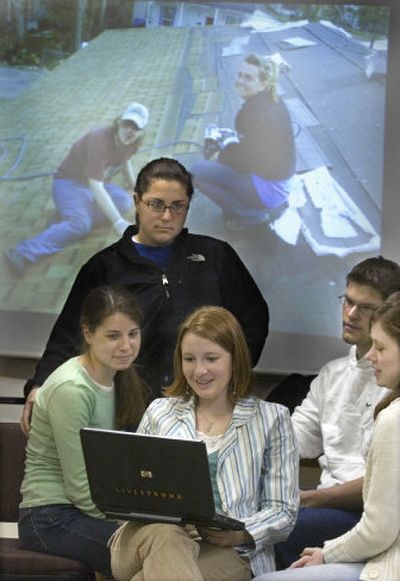Gulf Coast trip an eye-opener

The destruction still hung from the trees – clothing, plastic sheets, Mardi Gras beads twisted through the limbs. It filled the gutters and spread across the landscape.
When 18 Whitworth College students went south to help the victims of Hurricane Katrina, they were shocked at how far from recovery many of the impoverished victims were months after the storm.
“I didn’t think it was still that bad,” said Shannon Tudor, pointing to photos of streets where the houses are completely swept away. “They’re not just houses, they’re homes. They’re blown away. They’re washed away. They’re in the trees and in the gutters.”
The students spent 16 days in Gulfport and Biloxi, Miss., re-roofing homes, clearing away debris, and working in God’s Katrina Kitchen, a makeshift operation that fed people and handed out supplies. It was part of their January term program, an annual part of Whitworth studies that often includes study away from campus.
Valerie Iverson, a sophomore from Medford, Ore., said the trip left her “radicalized” in her commitment to fighting injustice. She said poverty, segregation and racial oppression were all parts of Southern society before the hurricane, but the storm put them under the microscope.
But as media attention fades, the problems do not.
“The work is not done,” Iverson said. “It’s going to take decades.”
Andrea Donahoe, a visiting professor of psychology, was one of two faculty members who helped oversee the trip. She provided an academic program on the psychology of poverty, while art professor Gordon Wilson had the students study folk art of the South.
“Having experienced that degree of injustice is going to help them be aware of injustice when they see it here,” Donahoe said.
Students and faculty said they saw that middle-class neighborhoods were cleaned up, but poor, black neighborhoods were not. They said they saw racism in the treatment of African American colleagues in restaurants. They saw Confederate flags in windows, on license plates and on T-shirts.
“You see them everywhere,” Tudor said. “It’s kind of disgusting.”
Cleanup is proceeding fastest at the casinos, they said, while devastated neighborhoods lie just blocks away. The Federal Emergency Management Agency is providing trailers for some of the homeless, but the process is slow, and many people were still waiting, students said. Other hurricane victims were still sleeping in tents, or under the remaining portions of their roofs.
Daniel Fry, a freshman from Spokane, said he’d seen pictures of the wreckage in the media but expected it would be more cleaned up by the time he and his classmates arrived. He talked to the owner of one home they re-roofed who’d lived through five hurricanes and was talking about getting out.
“It was very hard for him to say that, too,” Fry said.
On Tuesday morning, the students looked through their photos and talked about their experiences, in preparation for a presentation they’ll make to the student body. Tudor scrolled through photos on her laptop – pictures of trash-hung trees, flattened homes, crumbled roads.
“They just take it away by dump truck, no matter what it is – clothes, cardboard, leaves, roofs,” she said. “They take it to the landfill and burn it.”
She said the residents of that area lack even the simplest supplies. She remembered one woman who just needed a rag to do some cleaning.
“She was like, ‘Thank you,’ ” Tudor said. “It was just rags. She just needed something to clean up with. … It’s just the simplest things, like rags.”